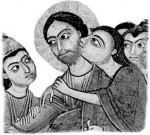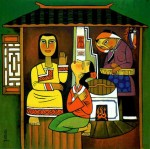 It has been an odd Easter, and I have resisted the temptations (a) to dwell on what has miffed me (b) to criticise what I've experienced in services and (c) to post anything until my last commitment was complete. There is a lot I could say - a lot that found its way into my paper (and now rarely used) journal but I want to post on one train of thought only.
It has been an odd Easter, and I have resisted the temptations (a) to dwell on what has miffed me (b) to criticise what I've experienced in services and (c) to post anything until my last commitment was complete. There is a lot I could say - a lot that found its way into my paper (and now rarely used) journal but I want to post on one train of thought only.
On Friday evening I was channel hopping in search of something worth seeing and happened across the start of the repeat showing of the Manchester Passion. I had loved it last year and thought it was worth seeing again; I was not disappointed. Granted, I knew the ending and remembered much of the broadcast, but it was no less powerful.
I have always had a soft spot for Judas, and as he sang 'Heaven Knows I'm Miserable Now' the poignancy of his predicament touched something very deep within. I don't do crying very often (like about once in ten years) but I found tears rolling down my cheeks as he sang. Poor Judas, torn apart, feeling isolated, let down, bewildered, having agreed to something he already regretted... not a typical 'bad guy.'
Maybe some of what he was singing/expressing connected with some of the vulnerability and scariness of being an HMF minister in a church that is always precarious; maybe the emptiness echoed some of what I felt about this Easter - who knows. Whatever it was, it got me thinking.
There are two key characters in the Garden of Gethsemane, Jesus and Judas, and each of them acts in some way vicariously for every person who ever lived. This is not the place for deep discussions on atonement theology, but if in some way Jesus' death was vicarious, then so was Judas' betrayal. If Jesus somehow stands in the place of 'fallen humanity' than so does Judas. We have no right to judge him, for we are him.
Whether Judas hanged himself or whether his guts spontaneously spewed forth (both Biblical) I have no idea. I feel for Judas, I really do. Some how or other life became impossible after his betrayal of Jesus. Tradition has it that he went to hell, scripture calls him a 'son of perdition' but when I think about him, recall how much Jesus loved him, I wonder. I find that I want either (a) to be a universalist or (b) to embrace unreservedly the expression of the theology of the 'harrowing of hell' that sees the whole purpose of descent as to redeem those who were there. I can't get to (a) otherwise I'm not sure what the point of the church is, and I have never studied (b) enough to fully appreciate its nuances. Theology aside, I long, and have done for as many years as I can recall, one day to discover that in the end Judas was reconciled to Jesus, to God. After all, there but for the grace of God go I.
Late on Saturday night I got an email from someone I'll call Jonathan. He is a member of my church but has been working away at a Christian centre for almost two years. Jonathan is gay. Jonathan had (has) a hardline theology of gayness and has spent as long as I've known him trying to make himself straight. Last night's email was not such a surprise, but it made me sad - after a long struggle it has become too much and faced with the choice 'God or Gay' he's decided to explore gay. He is lonely, angry, sexually frustrated, deadly earnest, and horribly, horribly confused. I am sad not because of the choice he's made (though I struggle with aspects of it) but because he feels he had to choose.
What should I do? It's an issue where I have no neat answers and struggle to find a 'standpoint.' It's an issue where I accept the BU rules for ministers. But I am Jonathan's pastor, not his judge, and, being female and straight aside, there but for the grace of God also go I. I have tried to encourage him not to see it as 'either/or,' reminded him of evangelical networks that affirm a range of standpoints on human sexuality issues (he is terrified of liberalism), and assured him of my support whatever he decides.
Are Jonathan and Judas so very different? Am I? Are you? Where does the balance between inclusiveness and anything goes lie?
The last contact between Jesus and Judas was a kiss - how ironic that a first century greeting would be seen as 'gay' in our culture and age. How ironic that love and intimacy should become so perverted, not by issues of sexuality but by intent. How ironic that when I want to save Judas, I am called to stand beside Jonathan.
Not the Easter I anticipated. Not a story of resurrection joy, but one of being in a potter's field trying to talk Judas down from the tree, of praying that the Good Shepherd will go right to the bottom of the ravine (Paul Fiddes at his best) to rescue the weak, shivering lamb.
The Easter story never ceases to amaze me; just when I think I have a clue, the pieces shift and the view changes - I have no more 'got it' than the first disciples who found crazy women telling them impossible things. I still feel a little cheated that I didn't get to preach this year, but somehow, God has preached a sermon I needed to hear and then to share.
Please pray for Jonathan, and all the sad, bewildered, angry, frustrated, lost, alone, whatever-they-are Judas-like characters you know. And may the peace of Christ dwell richly in your hearts and minds this Eastertide and forever more.
 Martha - you know her, careworn red hands, face lined from frowning, always busy cooking and cleaning. Mary, beautiful, attentive, deeply spiritual... well that's the kind of images I grew up with anyway. So which one is it who recognises Jesus as who he is...? Why do Luke and John give us these seemingly contrasting portaits? Are they, in fact, contrasting? Or is it just that somewhere I have sold out to an unfair image of Martha (even if she's the one I feel more like, busy, practical and, when all's said and done, is making sure Jesus plus 12 hungry blokes and countless hangers on get the best dinner she can cook - yes, I know, that's Sunday School eisegesis or worse, but you get my drift).
Martha - you know her, careworn red hands, face lined from frowning, always busy cooking and cleaning. Mary, beautiful, attentive, deeply spiritual... well that's the kind of images I grew up with anyway. So which one is it who recognises Jesus as who he is...? Why do Luke and John give us these seemingly contrasting portaits? Are they, in fact, contrasting? Or is it just that somewhere I have sold out to an unfair image of Martha (even if she's the one I feel more like, busy, practical and, when all's said and done, is making sure Jesus plus 12 hungry blokes and countless hangers on get the best dinner she can cook - yes, I know, that's Sunday School eisegesis or worse, but you get my drift). It has been an odd Easter, and I have resisted the temptations (a) to dwell on what has miffed me (b) to criticise what I've experienced in services and (c) to post anything until my last commitment was complete. There is a lot I could say - a lot that found its way into my paper (and now rarely used) journal but I want to post on one train of thought only.
It has been an odd Easter, and I have resisted the temptations (a) to dwell on what has miffed me (b) to criticise what I've experienced in services and (c) to post anything until my last commitment was complete. There is a lot I could say - a lot that found its way into my paper (and now rarely used) journal but I want to post on one train of thought only.